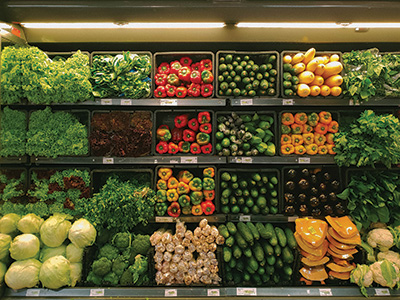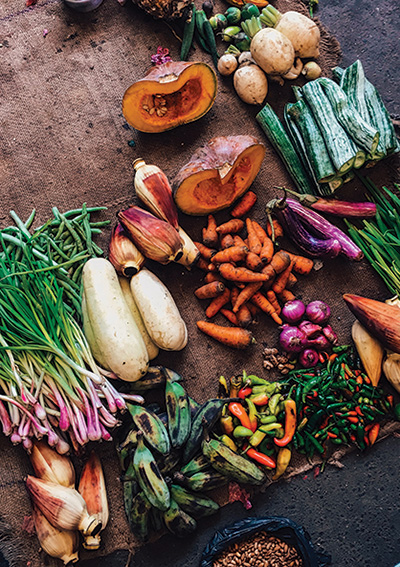Can organic Georgian produce cultivate new markets at home and abroad?
Global demand for organic produce is expected to reach more than $150 billion by 2025, with an increasing number of eco-conscious consumers looking to maximize the health benefits of their food and minimize their environmental impact. Investor.ge takes a look at how Georgia’s organic market is faring at home and abroad.
There’s been a fair amount of speculation in recent years as to whether Georgian agriculture can benefit from going organic. In the run up to the Covid-19 pandemic, the Georgian government announced the development of organic agriculture as part of its Green Policy, with then-Prime Minister Mamuka Bakhtadze telling young farmers “organic produce…this is exactly our niche.” This sentiment has been further reinforced by the millions of donor dollars poured into supporting farmers in this effort, claiming this can ‘unlock the potential of Georgian agriculture.’
And unlocking the potential of Georgia’s agricultural sector remains an essential task, with almost two-fifths of those employed working in a sector that is dominated by low yield subsistence farming and which contributed only 8% of the country’s GDP in 2020.
However, is going organic the answer to solving Georgia’s agricultural conundrum? While industry experts note that it likely won’t remedy the entire problem, a slow-growing number of niche exporters and local marketplaces suggest that there is room for Georgia’s green market to expand – both at home and abroad.
Investor.ge took a look at where organic may make sense, and where the sector still has room to grow.

Georgia’s organic export market
Nestled in the Alazani River Valley of Georgia’s eastern Kakheti region sits the village of Ruispiri and the marani of biodynamic winemaker Giorgi Aladashvili. His vineyard in the heart of Georgian wine country has taken an approach different from surrounding winemakers by incorporating organic methods into his agricultural process. He does not use agrochemicals in his vineyard, and instead utilizes composted fertilizers, horse-powered plowing, and a harvest schedule based on the lunar calendar – all of these make for a more labor-intensive and expensive process than standard agricultural practices.
Despite the extra work, Aladashvili, who sells his products in Switzerland, says his organic endeavor is paying off. “I produce about 7,000 bottles of wine a year. My bio-certified Saperavi, Kisi, Khikhvi and Kakhetian Mtsvane are sold under the Biovinia brand,” says Aladashvili. He says his wine costs 70 euros a bottle, a steeper price than most of his Georgian bio-wine counterparts charge but indicative of the lucrative market for some organic products in Europe.
Aladashvili is part of a slow-growing movement among Georgia’s agricultural producers using organic practices to cash in on lucrative export markets. Data provided by CaucasCert, Georgia’s largest organic certification company, shows that bio-wine’s success abroad is growing, with its certified producers exporting 4,000 liters in 2019 and 5,600 in 2020. Other notable organic exports reported by CaucasCert in recent years include tea, blueberries, blackberry leaves, wild apples, and seeds.
The cost of going organic
But despite the variety of products and success of niche products like bio-Saperavi, Georgia’s market for organic exports remains minor, due in part to the prohibitive costs of getting to external markets as well as the tendency of eco-conscious consumers to seek out locally sourced food.
To be certified organic in Georgia, CaucasCert estimates that the initial process costs between 1500 and 2000 USD. The organization, which is accredited in Germany and recognized by the European Commission as in compliance with EU regulations regarding organic standards, requires all applicants to undergo a conversion process and pass a series of inspections to legally label their products as “bio,” “organic,” or “ecological.”
The organization’s quality manager, Zurab Nadareishvili, says each farm must undergo a minimum of two inspections a year during the conversion process, one being scheduled in advance and the other conducted without notice. They are then required to submit to annual inspections to retain that certification. “Farms in Georgia are often less than 10 hectares. In such cases, the inspection takes about three hours. At a cost of $120 / hour, the average cost of one inspection alone is about $400-450.”

Tamaz Dundua, who is the director of Elkana, an NGO that promotes sustainable farming and the development of organic cultivation and marketing in Georgia, says that the small scale of most farms makes official certification cost prohibitive. “Most of the people employed in agriculture in Georgia do not produce enough products for export and it is difficult to pay for the certificate, so many of them refrain. They prefer to find customers in the local market themselves.”
Shop local, sell local
One such farmer that has chosen to go organic and focus on the local market is Nina Petrova-Dzneladze, whose farm is located near Lisi Lake in Tbilisi. She uses organic fertilizer made from plant waste and produces a variety of organic crops, but says exporting is currently out of the question. “It is a very difficult task for us: there is no subsidy or assistance, in addition to bank loans, a faulty insurance system and most farmers cannot switch to biologically pure products. Organic fertilizer is very expensive, and it is even more expensive to fight insects and pests,” says Petrova-Dzneladze. “We cannot even think about exporting products to Europe, because there are huge costs associated with getting an ecologically clean product to market.”
Instead, she chooses to focus on the market in Tbilisi, where her main crop, organic tomatoes, is highly demanded, and a lack of certification does not seem to deter local consumers. A study of the market by Ekoconnect found that direct contact with producers is valued highly for local consumers, providing “confidence that these foods are grown without mineral fertilizers and chemical pesticides and are therefore healthy.”
Due to the informal nature of many small-scale producers, sector insiders say it is hard to estimate just how many organic producers there currently are or how fast the sector is expanding. But a glance at the growing number of local organic marketplaces in Georgia’s largest cities clearly indicates that there is local demand for eco-friendly food.
In Tbilisi’s central Vera district, Sunflower Health Food Store offers customers a range of organic vegetables, bio-honey, and a number of other organic products produced in-house by the store’s operator. Just down the street, shop and café Au Ble’d’or sells fresh-baked breads made from locally-sourced heritage wheats, as well as an array of vegetables and fruit sourced from an organic farm in Kakheti.
In an effort to satiate growing demand for e-commerce options, Soplidan.ge was launched in 2015 with the goal of “connecting the city to the village” by delivering fresh produce from individual farms to customers in Tbilisi. While the website currently only offers two organic suppliers, its success provides proof that there is a sector of the population seeking out a farm-to-table element in their grocery shopping. For those even more organically minded, Ecomarket.ge was launched by Elkana in 2020 to provide an organic-only online marketplace for products like fruit, honey, tea, and wine.
Hans Gutbrod, the head of the agribusiness committee at AmCham and a regular contributor to Investor.ge, is a frequent customer of Tbilisi’s organic food stores. Noting that organic-conscious consumers value locally sourced products, he says he appreciates that organic fruits and vegetables are available. “It’s really important that more people in Tbilisi find out what great organic food is available already, so that the sector overall can grow and develop further.”
This article was prepared with the support of the USAID Economic Security Program.


